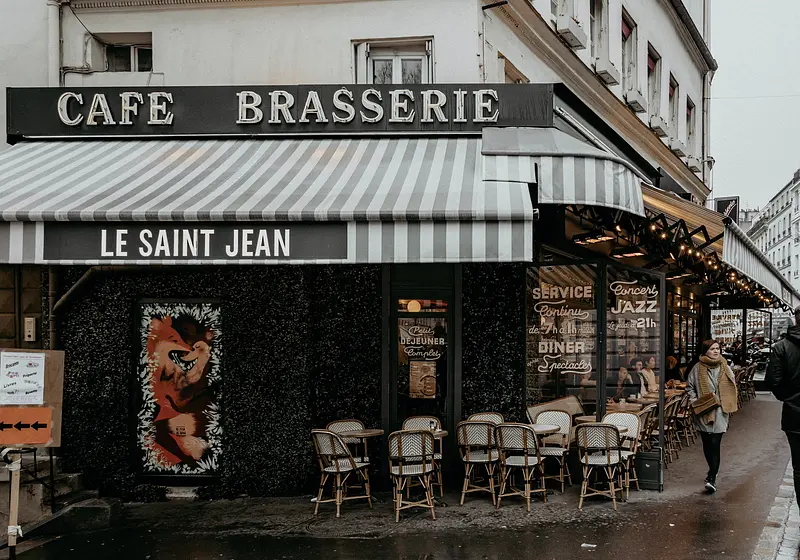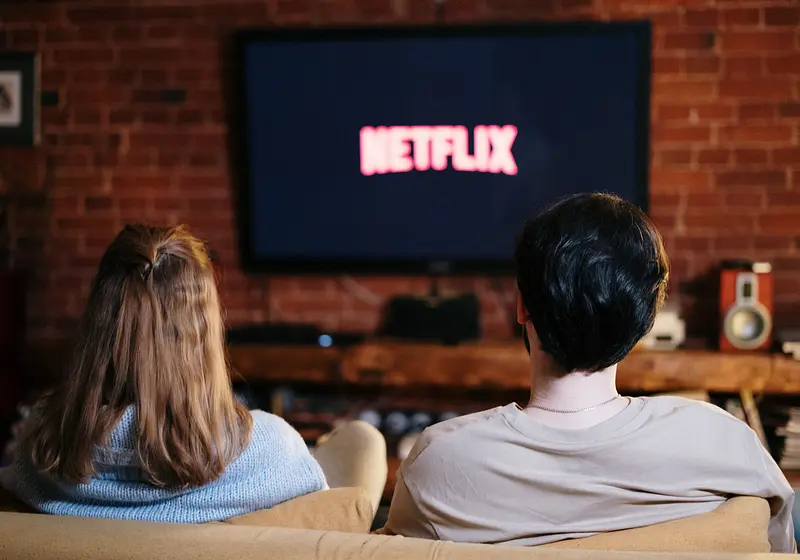Paris has always resembled a far away, unattainable fantasy. With today's global climate, the pit hole of Dreamland has deepened even more so.
But fear not, Netflix, and the Sex and the City creator Darren Star has resurrected Carrie Bradshaw's wardrobe and put it on a doe-eyed ingénue Emily Cooper, played by our favorite, Lily Collins.
When I read the preliminary reviews for Emily in Paris, the critics were less than complimentary, calling it an ill-timed and stereotypical rip-off.
But, oh, you, heart of a girl who's merely looking to escape reality and possibly stalk the hot actors on Instagram after binge-watching it in 6 hours — What say you?
The initial thoughts complied with the general reaction of the critics. The pacing was rapid for the sake of moving the plot with no regard for the characters' development. A deja-vu swept me under — the same nagging feeling of wanting to slap the screen that crept down my back when Carrie threw all rationale (and sound mind) into the wind and moved to Paris on a whim.
There is no preparation to look up the cultural differences, learn basic French, and not treat one of the oldest cities in the world like a personal circus. And Emily followed in her footsteps. But then the heart of the story plummeted through the screen at me: A foreign girl in a foreign land who is shunned out because she thinks and acts differently. I know that story.
After Episode three, the apparent commonalities with the Sex and the City phenomena retreated into the background, and the leaping differences popped out. Here are the three reasons why Emily is the 2020s Carrie, and the three reasons it cannot compare.
Let us slide into your dms 🥰
Get notified of top trending articles like this one every week! (we won't spam you)PRO: Fashion Choices
Listen, we all know no recent college graduate could afford the designer pieces Emily is wearing, much less pairing it up with accessories and Blahnik shoes.
As much as realists (and, you know, twenty-somethings that live in the everyday reality of college debts and putting salt and pepper on people's salads with a bachelor's degree in Marketing) would like to stress out the ridiculousness of it, have Emily parade herself around Paris in flip-flops and sweats would be utterly unappealing (although absolutely original and probably hilarious).
You are here to enjoy a fun rom-com, not to analyze the hem on Emily's couture.
Emily sticks out like a sore thumb with her bold outfit choices, pairing up pastel colors with dark palettes of the color spectrum, and she looks fabulous while strolling down the cobbled sidewalk.
The connection to Carrie is evident in this one. Not only was she a freelance writer living in Upper Manhattan in a rent-controlled apartment for 750 bucks a month, (I mean, seriously?) she could somehow afford to spend fifty grand a year on a collection of sandals and sport out the most extravagant outfits to date even by the 2020s standards.

Take the Quiz: Which Generation Matches Your Personality?
Discover the generation you truly belong to!
CON: American Exceptionalism
The Sex and the City series' success was primarily attributed to the charismatic casts and open conversations about relationships, Sex, and well, people. Carrie, Samantha, Miranda, and Charlotte often found themselves in a Curb your enthusiasm sort of shenanigans where they struggled to translate their basic needs onto partners, friends, and colleagues that would reciprocate the sentiment.
The series never shied away from highlighting the misogyny, objectifying women (and men, a crucial bullet point in our PowerPoint today) exclusion based on lifestyle, race, sexual orientation, and yes, the unique cultural climate in America.
Where Carrie in her column successfully and honestly communicated that while New Yorkers prefer to be grumpy yet honest, and LA-sunlight-lovers only pretend to be overly optimistic for the sake of it, the message was heard loud and clear: There isn't a right or wrong way to live, it's just a matter of preference, historical development, or geographical circumstances.
Emily in Paris fails miserably at that. From the get-go, we get into the business of the good guys and the bad guys, where, unfortunately for today's political situation, Americans are perceived as do-gooders with respectful views on women's rights and morale about exclusivity in marriages.
Maybe the reviewers and the audience would have been more generous towards the narrative five years ago. However, it still doesn't fix the issue of putting people into assorted boxes.
There are positive aspects to American individualism, optimism, and reservations in displaying public affection, and there are negatives to it. There are positives to the French openness in relationships, their passion for enjoying fine things in life, and negatives to it.
Writing dialogues that portray Emily as the Emily from the Devil Wears Prada movie, where she cannot catch a break no matter how hard she tries, does not fit the purpose here.
They would be more accepting of you if you didn't try to convert their thousands of years of culture into your Americanness. Word of advice — people hate being lectured about their customs no matter where in the world you go, Emily. Therefore, we cannot stan.
PRO: Likable Protagonists
Although Carrie might have been the least favorite character in the Sex and the City movies, she could display compassion and make the right decision on occasion.
Regardless, all the girls had their faults and their fears that they were working through; after all, that is what we all do all our lives. But giving those flaws a life on the screen is challenging, to say the least.
What the Sex and the City did terrifically was portraying the four central characters as one another's soulmates, yet still found a stable character arc for their partners to fit into it while keeping the girls adorkably likable and equally hate-able at the same time.
Emily in Paris hits a few nails on the head while simultaneously misses a few marks in the process. Nevertheless, Emily's best friend Mindy has a steady progression towards improvement and shows a tremendous support for the culturally shocked Emily.
Emily's love interest Gabriel is an all-around sympathetic guy with sympathetic struggles to establish himself in the merciless city as a chef. Lucas Bravo brings calmness and intelligence to the twenty-something Gabriel that would probably be portrayed as narcissistic and selfish had it been a different show.
The friendship between Gabriel's girlfriend and Emily might be a washed-out storyline, but it's nice to see women cooperate and get along instead of finding ways to bicker over a guy for once. Good job, Darren Star.
CON: Stereotypes
We have discussed the cultural stereotypes before but in this instance, let's talk about casting stereotypes.
The journalist Elaine Sciolino a former chief for the Times, reflects on the times (ha) in which she had to assimilate into the Parisian environment while maintaining her persona as a writer.
And while she condones Emily's clumsiness and says that she has been through a similar ordeal, the wonderfully talented and wickedly smart Elaine Sciolino talks about the shock of an American in Europe from a perspective of a sophisticated white woman with an established brand — much like Emily.
Do we really need to see another naive white girl trying to make it in the big City? If we are to do this (which I highly support because I am a sucker for a good coming of age story) let's give a lead to a girl that would indeed struggle in Paris.
Emily is thin (no shade, Lily Collins has talked about her eating disorder openly, and we love love love a girl who raises awareness) beautiful, educated, well-spoken, well-read, and besides being slightly insensitive to the French manners, I don't see her struggle that much.
Thin, beautiful, and educated might as well be the national motto of France. I, for one, would like to see a girl of color with insane wit but no polished academic resume to try to convince the finesse of the finesse to listen to her. That would be a real struggle.
Unfortunately, Sex and the City is guilty of a lack of representation, too.
PRO: Humor
Sex and the City is widely popular due to the smart writing and hilarious dialogues. From Samantha's escapades with men to Miranda's quick feet thinking, we have laughed and cackled at the ridiculousness of their lives.
Emily in Paris manages to slip some of that into the dialogues, too. Although a bit too on the nose, the sheer relatability makes you at least nod in amused approval.
Emily books a vital business dinner with investors at a Michelin restaurant for 08/11 only to find out that in Europe, the date reads November 8th, not August 11th, and complains at the restaurant staff: “You switched the dates!” only to be reminded and tersely reprimanded: “No, you switched the dates.”
CON: It Gets Old After a While
I don't know about you, but I never got tired of Sex and the City (that is until I watched the movies, which I do not endorse in the slightest). There was always an infinite amount of Charlotte being Charlotte and Miranda yelling at Steve, and Carrie breaking up with Mr. Big, and Samantha finding new and new ways to explore her sexuality.
However, Emily in Paris is a ten-episode series with the second season already in the makings. Frankly, the story could have been told in less than eight. The secondary characters like Emily's boss started to get on my nerves after a gazillion temper tantrums, and the way all men repeatedly hit on her in not so subtle ways got boring after episode four.
Less is sometimes more.
All in all, if you feel the need to be entertained for half a day with no indefatigable agenda on your calendar, give Emily in Paris a try.











.jpg)



